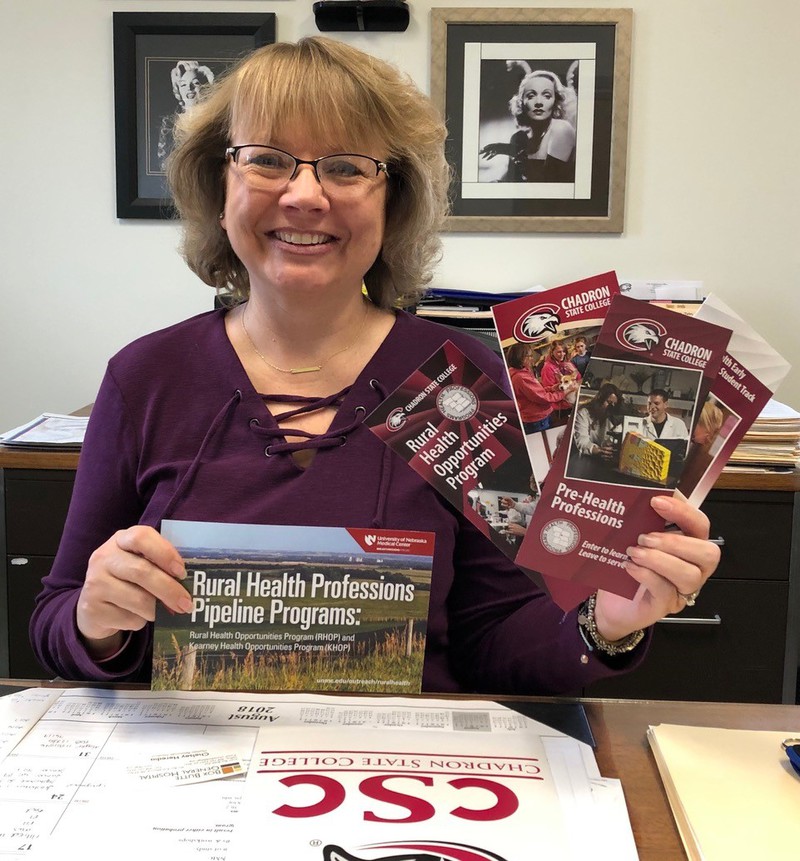CSC offers preparation for 19 health professions careers

CHADRON – The Rural Health Opportunities Program (RHOP) at Chadron State College has earned plenty of attention in the nearly three decades since it began as a joint effort with the University of Nebraska Medical Center to help provide doctors, nurses and other health care workers for underserved rural areas.
The focus on RHOP is fine, said Kristal Kuhnel, Director of Health Professions for CSC, but it can reduce awareness of the many other pre-professional training opportunities that Chadron State offers for students interested in careers in health care.
“What we don’t talk about enough is health professions,” Kuhnel said. “Health professions is the big picture; RHOP is a small portion. (RHOP) is limited to nine health care professions and we need more than that.”
In addition to the nine fields of study offered through RHOP, CSC offers preparation for 10 other health care professions, Kuhnel said. That means that students interested in pursuing careers such as optometry, podiatry, veterinary medicine and mortuary science can obtain their pre-requisite course work at Chadron State.
RHOP has a limited number of openings and is only for Nebraska residents, restrictions that exclude many qualified students who are planning careers in health care, said Kuhnel. Students who may not be certain of their career choice when they enter college can miss out on RHOP, which generally enrolls high school seniors who are focused on a particular medical profession.
“Sometimes you get to college before you figure out what path is for you,” Kuhnel said. “We get students like that all the time.”
Training requirements for the 19 different health professions vary but many of the pre-requisite courses are similar, according to Kuhnel.
In subsequent years, each student works with a faculty advisor to determine the courses needed for their particular field.
“What we are trying to do is check off all the boxes they need to get into the professional school they want to go to,” Kuhnel said. “Their advisor will sit down with them and look at those schools and make sure they have all the pre-requisites they need.”
Changes in entrance requirements for professional schools require Kuhnel and CSC science faculty to stay alert, so students find appropriate courses for their field.
“It’s constantly evolving” she said.
Not all health professions students will actually earn a CSC degree, Kuhnel said, because schools for some professions, such as nursing, pharmacy and mortuary science, don’t require four years of pre-requisites.
“If they don’t graduate with us, they will graduate with their professional school,” Kuhnel said. “Each profession has a unique take on it.”
Besides helping health professions students take the right classes, CSC assists them in many other ways.
Faculty members are generally on a first-name basis with their students and can write letters of recommendation that may be critical in gaining entrance to highly selective professional schools, she said.
“I think it really does make a difference, especially for students who are not applying to the University of Nebraska Medical Center,” Kuhnel said.
Help in arranging internship opportunities is another benefit for health professions students at CSC.
Kuhnel and faculty members also set up mock interview sessions to help students prepare for the process of gaining entrance to a professional school.
And there is a continuous emphasis on behavior, which can be an important factor in admission to a professional school, said Kuhnel.
“It’s tough to get into professional school. We have a really good record of our students getting in because we work with them on professionalism,” she said.
Students are also strongly encouraged to join the Health Professions Club, which provides opportunities to learn from others who are following similar paths. Senior club members help newer students with tips about preparing for entrance exams and useful study aids, and the club often brings in alumni to talk about their experiences.
While RHOP participants automatically receive tuition scholarships, CSC also has some other scholarship opportunities for students in specific health professions fields.
Recruiting for the health professions program, which takes Kuhnel to some 18 college fairs for high school students each September, is part of the effort to increase enrollment in the field.
The planned renovation and expansion of CSC’s Math Science building should help bring more students into the health professions program, according to Kuhnel.
“We are trying to have students prepared for a modern workforce in an antique building,” she said. “Our faculty are top notch, but it would be nice to have newer technology available, and larger labs. A new building would be very critical.”
Pre-Health Professions programs at Chadron State College
Chiropractic Medicine
Cytotechnology
Dentistry*
Medicine*
Nuclear Medicine
Occupational Therapy
Osteopathic Medicine
Physical Therapy*
Podiatry
Veterinary Medicine
Clinical Perfusion
Dental Hygiene*
Medical Laboratory Science*
Mortuary Science
Nursing*
Optometry
Pharmacy*
Physician Assistant*
Radiography*
(*Available for Rural Health Opportunities Program participants)
Category: Campus News, Physical and Life Sciences
